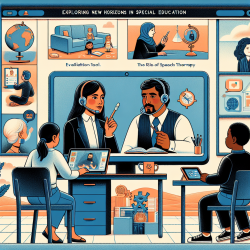Feeling Burnt Out? Here's Why Online Therapy is the Answer
In the ever-evolving landscape of special education, funding agencies are constantly seeking effective solutions to support students and educators alike. One area that has seen significant growth and proven success is online therapy. This innovative approach not only addresses the challenges faced by educators but also provides a sustainable model for mental health support and speech therapy.
The Growing Demand for Online Therapy
According to recent data, there has been a substantial increase in the demand for online therapy services, particularly in the realm of speech and mental health support. This surge is attributed to several factors:
- Accessibility: Online therapy breaks down geographical barriers, making it easier for students in remote or underserved areas to access quality care.
- Flexibility: The digital format allows for flexible scheduling, which is crucial for educators and students who are juggling multiple responsibilities.
- Cost-Effectiveness: By reducing the need for physical infrastructure and travel, online therapy presents a more budget-friendly option for funding agencies.
Addressing Burnout in Educators
Burnout among educators is a growing concern, with studies showing a direct correlation between teacher stress and student outcomes. Online therapy provides a dual benefit in this context:
- Support for Educators: By offering mental health resources and counseling, online therapy helps educators manage stress and prevent burnout.
- Improved Student Outcomes: When educators are supported, they are better equipped to focus on their students' needs, leading to enhanced educational experiences.
Data-Driven Success
Data-driven decisions are at the heart of successful online therapy programs. By leveraging analytics, special education funding agencies can track progress and outcomes, ensuring that resources are allocated effectively. Key metrics include:
- Student Engagement: Monitoring participation rates helps in understanding the effectiveness of therapy sessions.
- Progress Tracking: Regular assessments provide insights into students' improvements over time.
- Feedback Loops: Continuous feedback from educators and students allows for the refinement of therapy methods.
Conclusion
As special education funding agencies look to the future, online therapy stands out as a viable solution to the challenges of burnout and accessibility. By prioritizing data-driven decisions and focusing on the mental health of both educators and students, agencies can create a sustainable and effective model for special education support. Embracing online therapy is not just a trend; it's a strategic move towards a more inclusive and supportive educational environment.










